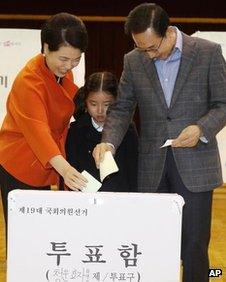South Korea vote 'remains too close to call'
- Published

Initial parliamentary election projections in South Korea indicate a tight race between the ruling Saenuri party and the opposition Democratic United Party (DUP).
While at least one poll has predicted that the Saenuri party will secure a small majority, most suggest that the result remains too close to call.
The vote is being seen as a key test for President Lee Myung-bak.
Domestic economic issues were the top priority for most voters.
National security was also a major issue during the campaign.
Apologising for 'disappointment'
State broadcaster KBS said that with nearly 90% of ballots counted, the ruling party was expected to win 152 seats in the 300-member parliament.
The AFP news agency quoted DUP Secretary General Park Sun-Sook apologising to his supporters for "disappointing" them.
This is the first time in 20 years that the parliamentary and presidential elections - scheduled for December - have fallen in the same year.
Turnout was 54.3% compared to 46.1% four years ago, according to election officials.
Voters will directly elect 246 members of parliament, with the rest chosen by proportional representation.
The polls, which closed at 18:00 (09:00 GMT), are seen as a referendum on Mr Lee's term in office and the Saenuri party's prospects for the presidential election.
Early in the day Mr Lee cast his ballot at a polling station near the presidential office, accompanied by first lady Kim Yoon-ok and their granddaughter.
He greeted voters but did not make any comments on the poll, national news agency Yonhap reported.
Analysts quoted earlier in the South Korean media predicted that the National Assembly would be evenly split between the two rival parties.
Currently, the conservative Saenuri (New Frontier Party) has 165 seats in the outgoing parliament, while the liberal opposition DUP has 89 seats.
Early in the race, the DUP was tipped to win, with analysts citing Mr Lee's unpopular pro-business policies as a reason.
But opposition mistakes involving its choice of candidates have resulted in gains for the governing party, some analysts say.
One of the key issues dividing the parties is the recently ratified free trade agreement with the US. The opposition wants to renegotiate the deal.
A planned rocket launch by North Korea this week and the possibility of a third nuclear test may have loomed large for the nation recently, but international relations and security issues are of little or no impact on this election.
Voters are more concerned over domestic issues, in particular the growing income gap and inflation, say analysts.
A win for the pro-business, ruling party would prove to be a big boost for its leader and presumed presidential candidate Park Geun-hye.
Ms Park is the daughter of the country's former President Park Chung-hee. Her potential rival from the opposition is human rights lawyer Moon Jae-in.
Mr Moon, who served as chief of staff in the office of the late former President Roh Moo-hyun, is running for a seat in the southern port city of Busan.
- Published10 April 2012
- Published10 April 2012
- Published2 February 2012
- Published24 October 2011